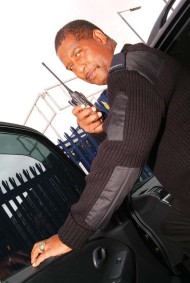 An increasing number of warehouse and logistics companies are returning to manned guarding in a bid to bolster security. The rise is a result of businesses – and in many cases their insurers – who believe technology measures such as CCTV and alarms fail to prevent internal and external crime. According to Gary Powers, Managing Director of Regency Guarding & Event, they are now turning back to people to provide the solution.
An increasing number of warehouse and logistics companies are returning to manned guarding in a bid to bolster security. The rise is a result of businesses – and in many cases their insurers – who believe technology measures such as CCTV and alarms fail to prevent internal and external crime. According to Gary Powers, Managing Director of Regency Guarding & Event, they are now turning back to people to provide the solution.
Powers explained: “Since the ‘80s, video and access control systems have been replacing guards, and technology now dominates warehouse security. But the trend seems to be reversing.” Over the past year his companies, which include both physical and technology security services, have seen a sharp increase in guarding enquires from this sector.
From a security perspective, the industry supply chain is complex. Moving a product from A to B necessitates transportation, consolidation, warehousing and distribution, plus large numbers of staff are involved in the process. Each of the stages is a potential weak spot which can be targeted, and represents a unique set of variables for a security strategy to consider. “Securing an entire supply chain is difficult, and technology – despite its sophistication – simply can’t replace human capabilities in every aspect, not when so much is expected. Secure, fail-safe systems that can’t be predicted and overcome by intruders,” said Powers.
 Take CCTV for example. Warehouses are generally large units with a continually shifting landscape – people, pallets, and trucks move in and out around the clock. Even the most high-res cameras will have trouble capturing every angle, and the constant repositioning and monitoring necessary is impractical and expensive. People can simply keep their head down or put on a hat to avoid being clearly identified. The other problem is that most theft activity recorded in a logistics environment looks exactly like normal, routine work. All this means that even when crime is detected on camera, the damage has already been done.
Take CCTV for example. Warehouses are generally large units with a continually shifting landscape – people, pallets, and trucks move in and out around the clock. Even the most high-res cameras will have trouble capturing every angle, and the constant repositioning and monitoring necessary is impractical and expensive. People can simply keep their head down or put on a hat to avoid being clearly identified. The other problem is that most theft activity recorded in a logistics environment looks exactly like normal, routine work. All this means that even when crime is detected on camera, the damage has already been done.
Another popular security measure which offers limited protection is the alarm. Powers explained: “Alarms generally have to be switched off when staff are on site, which for a busy warehouse is most of the time. But that’s not the only problem. When they are on, criminals have nothing to lose by testing them. We tried this during a risk assessment for a new client recently, but after 45 minutes of the alarm sounding there was still no sign of the police or a manager. Essentially no-one nearby had heard the alarm, or just assumed someone else was dealing with it.”
It is these limitations in technology which manned guards are able to compensate for to a large extent – particularly when it comes to preventing security breaches. For example, security guards can cover most ground and secure awkward, hidden areas. They can also ensure containers are sealed or locked, and keep a close eye on what is going in and out of a warehouse – something a CCTV operator would have a hard job picking up and reacting to.
Often, the mere presence of physical security is enough to deter a potential thief completely. Guards can apply profiling techniques and local knowledge to recognise suspicious or unusual patterns of behaviour, plus they are far less predictable than technology. They will also alert the police, identify the perpetrator and potentially stand witness against them at a trial. Internally, guards serve as a constant reminder that a company doesn’t tolerate theft.
Another issue with technology which physical security is able to overcome is evaluation, as Powers explained: “Warehousing and logistics by nature are in more or less a constant state of flux – staff, inventory, even layouts change. The problem with technology is that it’s only effective as long as security risks stay the same. Once they change, it could miss something crucial.” Guards, on the other hand, are able to carry out regular risk assessments which take new or changing threats into account. They can then adjust security policies and procedures where necessary to ensure overall security remains water tight.
 What is clear is that technology is only ever going to be as good as the people behind it. At the same time, guards have to be supported by technology in order to meet the demands of the warehouse and logistics industry. “In most cases, a balance between technology and physical security gives the best results. And because they back each other up – a guard is able to make the most of the technology and vice versa – it’s usually highly cost-effective” added Powers.
What is clear is that technology is only ever going to be as good as the people behind it. At the same time, guards have to be supported by technology in order to meet the demands of the warehouse and logistics industry. “In most cases, a balance between technology and physical security gives the best results. And because they back each other up – a guard is able to make the most of the technology and vice versa – it’s usually highly cost-effective” added Powers.
Annual losses total millions of pounds for the UK warehouse and logistics industry. It’s a figure which represents not only lost assets, but damage to property, increased insurance premiums, court proceedings, administration and time. And now, with a tough economic climate and black markets swallowing anything from scrap metal to wiring, the need for a balanced approach to security is essential.
For more information visit www.regencysecurity.co.uk




Comments are closed.